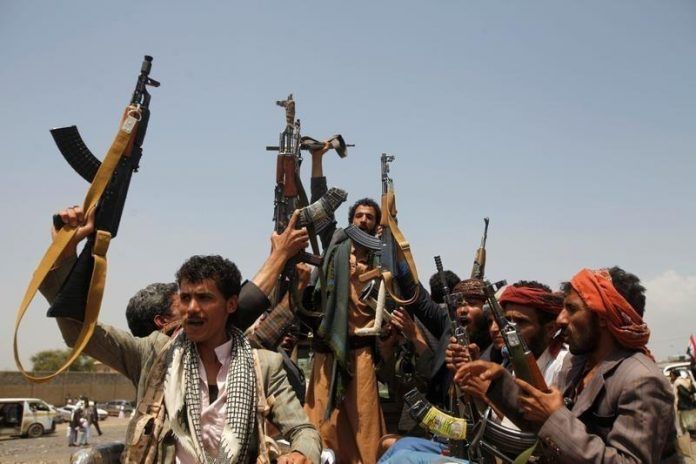
By Sarah Dadouch and Noah Browning
RIYADH/DUBAI, May 9 (Reuters) – Yemen’s Houthis fired a salvo of ballistic missiles at Saudi Arabia’s capital on Wednesday – an attack Saudi authorities said they intercepted in the skies over Riyadh.
The assault took place a day after Saudi Arabia’s top Western ally the United States pulled out of a deal with Iran over its disputed nuclear programme and could signal an uptick in tensions between Riyadh and regional rival Tehran.
The Houthis said the missiles were launched at economic targets in Riyadh, the group’s al-Masirah TV reported. At least four blasts were heard in the city centre, but there were no immediate reports of casualties or damage.
The Houthis, an Iran-allied group that controls much of Yemen including the capital Sanaa, have fired a series of missiles into the kingdom in recent months, part of a three-year-old conflict in Yemen widely seen as a proxy battle between Saudi Arabia and Iran.
A U.S.-backed, Saudi-led military coalition is fighting against the Houthis on behalf of the government of President Abd Rabbu Mansour al-Hadi, who lives in exile in Riyadh.
Colonel Turki al-Malki, spokesman for the Saudi-led coalition, said in a statement that Saudi air defences had intercepted one missile, with another falling in an uninhabited desert south of the city.

He later said in a separate statement that the Houthis had “failed to launch a short-range Badr-type rocket” towards the Saudi province of Najran but it fell in a non populated desert area.
A spokesman for the Houthi-aligned military, Colonel Aziz Rashed, told pro-Houthi al-Masirah television that the attack marked “a new phase” and was revenge for Saudi air strikes on Yemen, after a coalition air strike last month killed the Houthis’ top civilian leader.
“There will be more salvos until this enemy is deterred, understands the meaning of the Yemeni threat and ceases its crimes,” Rashed said.
He did not mention U.S. President Donald Trump’s decision hours earlier to pull out of the international nuclear accord with Iran. But there are fears that the decision could exacerbate the conflict in Yemen and other regional flashpoints.
“HOSTILE ACTION”
Saudi Arabia and its allies queued up on Wednesday to praise Trump’s decision, including Yemen’s internationally-recognised government, which said the U.S. withdrawal was necessary to stop Iran’s “destabilising and dangerous” behaviour.
“The Iranian regime has exploited the benefits of the nuclear agreement to export violence and terrorism to its neighbours,” it said in a statement.
The Saudi-led military coalition has intervened in Yemen’s civil war since 2015 to fight against the Houthis.Iran and the Houthis dismiss Saudi accusations that Tehran arms the group.
Saudi state media said separately that air defence forces had intercepted a missile launched at the southern city of Jizan, in an attack also claimed by the Houthis.
“This hostile action by the Houthi militia backed by Iran proves the continued involvement of the Iranian regime,” Saudi-led coalition spokesman Malki was quoted as saying by state news agency SPA.
Saudi Civil Defence will test a warning siren in Riyadh and other provinces on Thursday. It has instructed citizens upon hearing the alert to seek shelter in secure locations and avoid “areas prone to air strikes and missile strikes”.
(Reporting by Sarah Dadouch and Marwa Rashad; Editing by Catherine Evans, Andrew Heavens, William Maclean and Peter Graff)

